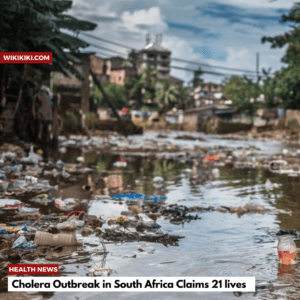A cholera outbreak in South Africa has resulted in the loss of 21 lives, with the disease spreading to the Free State. The Department of Health has provided updates on the situation, including the number of patients, deaths, and efforts to contain the outbreak.
Also Read: Popocatepetl Volcano in Mexico Spews, Threatening Millions

A recent cholera outbreak in South Africa has led to multiple deaths and raised concerns about public health and water management in the affected areas. The outbreak initially occurred in Hammanskraal, north of Pretoria, but has since spread to the Free State. This article provides an overview of the situation, including the number of deaths and cases, government response, challenges faced, and preventive measures.
Rising Death Toll and Cases
The Department of Health has reported that the number of deaths related to the cholera outbreak in Hammanskraal, north of Tshwane, has risen to 20. The outbreak has affected a significant number of individuals, with 179 patients being seen at the Jubilee District Hospital as of May 24, 2023. Of these patients, 18 were transferred to other hospitals for further treatment. Additionally, three police trainees in Hammanskraal have tested positive for cholera.
Response from Health Authorities
The Acting Minister of Health, Dr Aaron Motsoaledi, the Deputy Minister of Health, Dr Sibongiseni Dhlomo, and Gauteng MEC for Health and Wellness, Nomantu Nkomo-Ralehoko, visited the Jubilee Hospital to assess the situation and monitor the effectiveness of government interventions. The delegation was accompanied by experts from the National Institute for Communicable Diseases (NICD), the World Health Organization (WHO), and senior officials from national and provincial health departments.
Also Read: WFP Appeals for $810 Million to Hunger Emergency in the Horn of Africa
Water Supply Challenges
Poor water management and infrastructure have been identified as contributing factors to the cholera outbreak. The water plant responsible for water purification in Hammanskraal requires immediate upgrading, estimated to cost $130 million. The plant has been out of capacity for 18 years, and its malfunction has affected the quality of water supplied to the community. Water shortages have been reported in some schools, necessitating urgent delivery plans to provide clean water to affected areas.
Water Infrastructure and Refurbishment Efforts
The critical role of water infrastructure in preventing cholera outbreaks cannot be overstated. The Rooiwal wastewater treatment plant, responsible for water purification in Hammanskraal, urgently requires refurbishment. The plant has been operating below capacity for 18 years, and an estimated investment of $130 million is needed for its upgrade. Water and Sanitation Minister Senzo Mchunu is scheduled to meet with the City of Tshwane Mayor, Cilliers Brink, to develop a joint plan to address this long-overdue refurbishment. Adequate funding and swift action in upgrading the wastewater treatment plant are crucial to prevent further contamination of water sources and contain the outbreak.
Impact on Education
The cholera outbreak has not affected teaching and learning in the affected area, according to the Gauteng Department of Education. However, there have been water shortages at some schools, and plans are underway to deliver water to 61 schools in Hammanskraal to alleviate the situation.
Cholera Outbreak in South Africa and Neighboring Countries
South Africa is the latest country in southern Africa to be affected by a cholera outbreak, following outbreaks in Zimbabwe and Malawi earlier in the year. The World Health Organization (WHO) has highlighted the rising number of cholera outbreaks in Africa, with at least 12 countries reporting cases this year. The outbreaks have been attributed to poor sanitation and climate factors such as cyclones and floods.
Also Read: Italy’s Worst Flooding in 100 Years, Atleast 15,000 People Displaced
Testing and Contamination Sources
Authorities in South Africa are conducting extensive testing of various water sources, including tankers, taps, and wastewater treatment plants, to identify the exact cause of the contamination and prevent further spread of the disease. No evidence of cholera bacteria has been found thus far, indicating that the outbreak might be a result of a once-off contamination event with secondary and tertiary cases.
Laboratory-Confirmed Cases and Symptoms
The number of laboratory-confirmed cholera cases in Hammanskraal stands at 29, with an additional 67 people admitted to the hospital. Cholera is a waterborne disease that causes symptoms such as acute watery diarrhea, vomiting, and weakness. Contaminated water and food are the main sources of transmission.
Government Actions and Prevention Measures
The South African government is conducting extensive testing of water sources, including tankers, taps, and the wastewater treatment plant, to identify the source of contamination. The public is advised to report symptoms such as diarrhea, nausea, vomiting, stomach cramps, and dehydration to the nearest health facilities for medical treatment. Preventive measures, such as drinking and cooking with clean water, practicing good hygiene, thorough cooking of food, and washing fruits and vegetables before consumption, are recommended to prevent cholera transmission.
United Nations Assistance
The United Nations has pledged its support to South Africa’s efforts to combat the cholera outbreak. They are mobilizing technical and material resources to aid affected communities and prevent the situation from worsening. Collaborating with the government, the UN is particularly focusing on Gauteng and the Free State, where the outbreak is most severe.
Conclusion
The cholera outbreak in South Africa, particularly in Hammanskraal, demands urgent action from all stakeholders. The government, in collaboration with healthcare professionals and international organizations, must intensify efforts to contain the spread of cholera, provide necessary medical treatment, and address the underlying causes of the outbreak. Additionally, investing in water infrastructure and sanitation facilities is crucial to prevent future outbreaks and safeguard the health of the population. By implementing comprehensive interventions and promoting hygiene and clean water practices, South Africa can overcome this crisis and protect its citizens from the devastating impact of cholera.
Also Read: Germany Faces Recession as Inflation Takes Toll on Economy

















+ There are no comments
Add yours